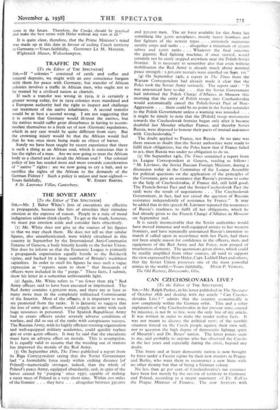TRAFFIC IN MEN
[To the Editor of THE SPECTATOR] SIRS If " colonies " consisted of cattle and coffee and mineral deposits, we might with an easy conscience bargain with them for peace with Germany, but transfer of African colonies involves a traffic in African men, who ought not to be treated by a civilised nation as chattels.
If such a transfer was wrong in /919, it is certainly a
greater wrong today, for in 1919 colonies were mandated and a European authority had the right to inspect and challenge our treatment of the native inhabitants. A second transfer would be at best a second wrong. I am not suggesting that it is certain that Germany would ill-treat the natives, but the natives would suffer great disturbance in having to accom- modate themselves to a fresh set of new (German) regulations, which in- any case would be quite' different from ours. But the crowning injury would be that the African would feel that he was once more being made an object of barter.
Surely we have been taught by recent experience that there
is such a thing as an African soul, which is conscious that it has the rights of a man. Are we now going to treat the African body as a chattel and to insult the African soul ? Our colonial policy of late has tended more and more towards consideration of " native " rights : are we now going to cry a halt, and to sacrifice the rights of the African to the demands of the German Fiihrer ? Such a policy is unjust and near-sighted.— Yours faithfully,. W. EMERY BARNES. 8 St. Lawrence Villas, Canterbury.










































 Previous page
Previous page